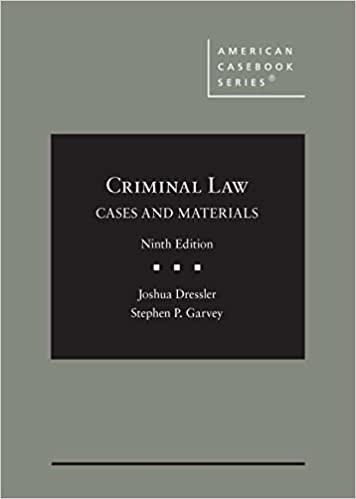Answered step by step
Verified Expert Solution
Question
1 Approved Answer
context: Case Study #1 - Who's on Trial here? The following case appears to be straight forward. Jessica Lester died from injuries suffered in an
context: Case Study #1 - "Who's on Trial here?" The following case appears to be straight forward. Jessica Lester died from injuries suffered in an auto accident caused by the driver, William Donald Sprouse ("Sprouse"), who was driving for Allied Concrete Company at the time of the event. While that seems simply to determine, "who's at fault", there are other factors involved in this case that appear to be at play. You are to read the entire assignment first, then read the case online. Once you have done your research, answer all the questions posed, and post your initial discussion prior to Week 3. Please see the course schedule for details regarding the posting. ALLIED CONCRETE COMPANY, et al. v. Isaiah LESTER, Individually and as Administrator of the Estate of Jessica Lynn Scott Lester. Background: "On June 21, 2007, Isaiah Lester ("Lester") was driving his wife, Jessica, to work, traveling west on the Thomas Jefferson Parkway in Albemarle County, Virginia. At the same time, William Donald Sprouse ("Sprouse"), an employee of Allied Concrete Company ("Allied Concrete"), was operating a loaded concrete truck and traveling east on the Thomas Jefferson Parkway. Due to his speed, Sprouse lost control of his vehicle, causing it to cross the center line and tip over, landing on the vehicle occupied by Lester and Jessica. As a result, Jessica suffered injuries that ultimately proved to be fatal. Sprouse subsequently pled guilty to manslaughter in the death of Jessica. On May 16, 2008, Lester, as Administrator and beneficiary of Jessica's estate, filed a complaint against Allied Concrete and Sprouse, seeking compensatory damages for economic and noneconomic losses, including mental anguish, for the wrongful death of Jessica. Jessica's parents ("the Scotts") were also named as statutory beneficiaries. Lester also filed a separate complaint against Allied Concrete and Sprouse, seeking compensatory damages for his personal injuries. These actions were ultimately consolidated." TRIAL: "Trial in this case commenced on December 7, 2010. After a three-day trial, the jury awarded Lester $6,227,000, plus interest, on the wrongful death action, and $2,350,000, plus interest, on his personal injury action. Similarly, the jury awarded each of the Scotts $1,000,000, plus interest, on the wrongful death action. Allied Concrete filed multiple post-trial motions, including motions for sanctions against Lester and the lead attorney on the case, Matthew B. Murray ("Murray"), arguing that Lester conspired with Murray to intentionally and improperly destroy evidence related to Lester's Facebook account and provided false information and testimony related to his Facebook page, his prior use of anti-depressants, his medical history, and the spoliation of Facebook evidence. Further, Allied Concrete contended that Murray engaged in deception, misconduct, and spoliation related to Lester's Facebook account. Allied Concrete also filed a motion seeking, alternatively, dismissal of Lester's claims, a new trial on liability and damages, a new trial on damages only, or a remittitur order, arguing that the misconduct of Lester and Murray precluded an impartial trial and verdict and resulted in an excessive verdict. Finally, the defendants filed a motion for a mistrial due to newly discovered juror bias." My question is, According to the REMITTITUR, "The trial court also found that "the amount of the verdict, in this case, is so excessive on its face as to suggest that it was motivated by bias, sympathy, passion or prejudice, rather than by a fair and objective consideration of the evidence." In making this ruling, the trial court specifically found that Murray's actions at trial were "geared toward inflaming the jury," which contributed to the jury's excessive verdict. The trial court also noted that Allied Concrete's aggressive defense strategy further served "to create additional passion and sympathy for Lester and anger towards [Allied Concrete]." If you were the judge in this case, and you had all the facts of this case before you, would you agree with the Remittitur statement, or disagree? Why or why not
Step by Step Solution
There are 3 Steps involved in it
Step: 1

Get Instant Access to Expert-Tailored Solutions
See step-by-step solutions with expert insights and AI powered tools for academic success
Step: 2

Step: 3

Ace Your Homework with AI
Get the answers you need in no time with our AI-driven, step-by-step assistance
Get Started


